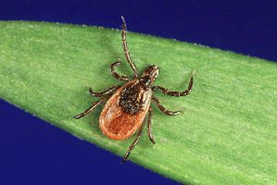Insects and ticks
Kejimkujik National Park and National Historic Site
Insects
During the spring and summer you need to be prepared for biting insects such as blackflies and mosquitoes. Cover up or wear specially designed bug jackets. Use insect repellent.
Learn more about the prevention and treatment of West Nile Virus (Public Health Agency of Canada).
Ticks

Blacklegged (deer) tick and Lyme disease
Blacklegged ticks and the bacteria that cause Lyme disease are known to be present in mainland Nova Scotia, including Kejimkujik. From April to November, there is a small chance of being exposed to Lyme disease if bitten by an infected blacklegged (deer) tick. Lyme disease is a serious illness, however, it's easy to prevent and treat when caught early.
For more information on Lyme disease, blacklegged ticks, and how to protect yourself from tick bites while enjoying the outdoors, please visit the following resources:
- The Public Health Agency of Canada’s Lyme Disease Fact Sheet
- Nova Scotia Department of Natural Resources: Tick Information
Dog tick
Dog ticks are also known to be present at Kejimkujik.
Unlike Blacklegged ticks, Dog ticks do not carry Lyme disease.
The presence of Dog ticks is very weather-dependent. Dog tick numbers decline when hot summer weather begins (often late June to early July) and remain present at reduced levels through the summer.
Related links
- Date modified :